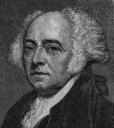The Life and Legacy of Alexander Hamilton
|

|
|
Share This Page
|
|
|
|
|
|
|
Follow This Site

|
 |
|
|
|
|

|
Part 6: Wars Inside and Out
In 1791, Hamilton released his famous Report on Manufactures, which urged the United States to pursue major avenues of industry and manufacturing, in order to compete with the powerful nations of the world. Hamilton foresaw a strong America, built on factories and exports and commerce and trade, circulating its ideas of liberty and freedom along with its goods, around the globe.
Hamilton went out of his way during this time to avoid a war with Great Britain. Many of his opponents accused him of being Britain-friendly and openly envious of Britain and its monarchy. At the same time, Hamilton didn't want full relations with France, which he considered unstable. His suspicions were proved true when the French Revolution came about. Hamilton's support of Britain and opposition to France were the exact opposite of the thinking put forward by Jefferson and Madison—yet another issue to be debated in the political party realm.
 Hamilton was instrumental in the success of the Jay Treaty, which avoided a second war with Great Britain. He also saw his economic policies bearing fruit. He persuaded Washington to run for re-election, and the popular president was elected to a second term.
Hamilton was instrumental in the success of the Jay Treaty, which avoided a second war with Great Britain. He also saw his economic policies bearing fruit. He persuaded Washington to run for re-election, and the popular president was elected to a second term.
Hamilton would not see the end of that second term, however. He had grown weary of the constant attacks by his political opponents, Jefferson chief among them. By this time, newspapers were active in the political fight, leveling scandalous charges against the leaders of both political parties on an almost daily basis. Hamilton, a once-poor, once-unprivileged man who had grown to be one of the most powerful men in the country, resented charges that he wanted an American kingship and that he himself wanted to sit on such a throne. Not long after the passage of the Jay Treaty, in 1795, Hamilton left his post as Secretary of the Treasury.
He and his family moved back to New York City, and he began to practice law again. When Washington retired, he wanted to give a speech, to warn his successors of certain things, among them the dangers of political parties. Hamilton happily wrote this speech for Washington, who edited it but kept the basic ideas.
Even though Hamilton was not publicly involved in politics, he still had his hand in the goings-on of government occasionally. One of these occasions led to one of the worst scandals in the very young history of the country.
 The second President of the U.S., John Adams, had appointed James McHenry as his Secretary of War. McHenry routinely (and secretly) asked Hamilton for advice. One of the things that McHenry became most famous for was recommending a special mission to France to calm the new leaders, who had become increasingly hostile since the announcement of the Jay Treaty.
The second President of the U.S., John Adams, had appointed James McHenry as his Secretary of War. McHenry routinely (and secretly) asked Hamilton for advice. One of the things that McHenry became most famous for was recommending a special mission to France to calm the new leaders, who had become increasingly hostile since the announcement of the Jay Treaty.
Adams agreed to the necessity of a mission and sent three men to meet with the French leaders. (They were John Marshall, Elbridge Gerry, and Charles Pinckney.) When the Americans arrived, they were told to deal with special agents who identified themselves only as Agents X, Y, and Z. These alphabetical agents asked for large bribes in exchange for doing business, and the Americans left in anger. This episode has been called The XYZ Affair and served to anger the American people against France.
Next page > Elections and Influence > Page 1, 2, 3, 4, 5, 6, 7, 8, 9



 Hamilton was instrumental in the success of the
Hamilton was instrumental in the success of the  The second President of the U.S.,
The second President of the U.S., 
